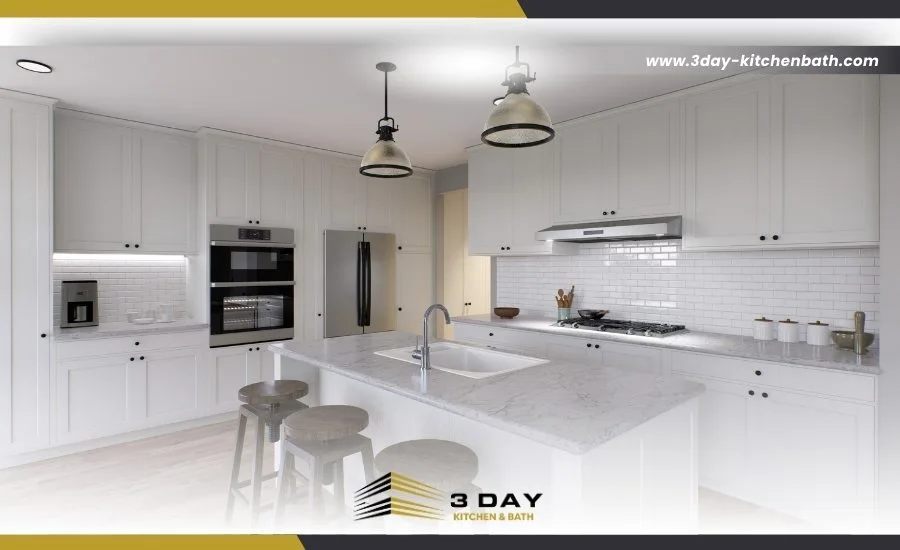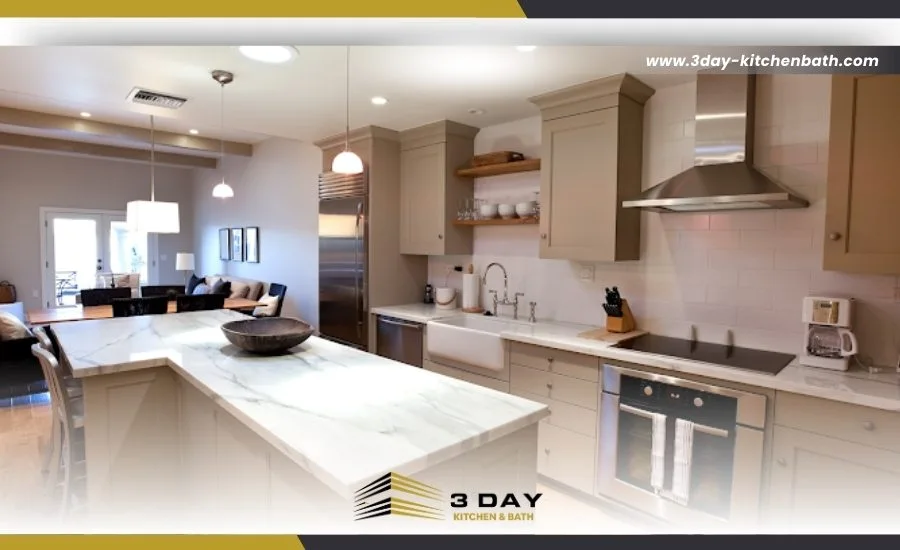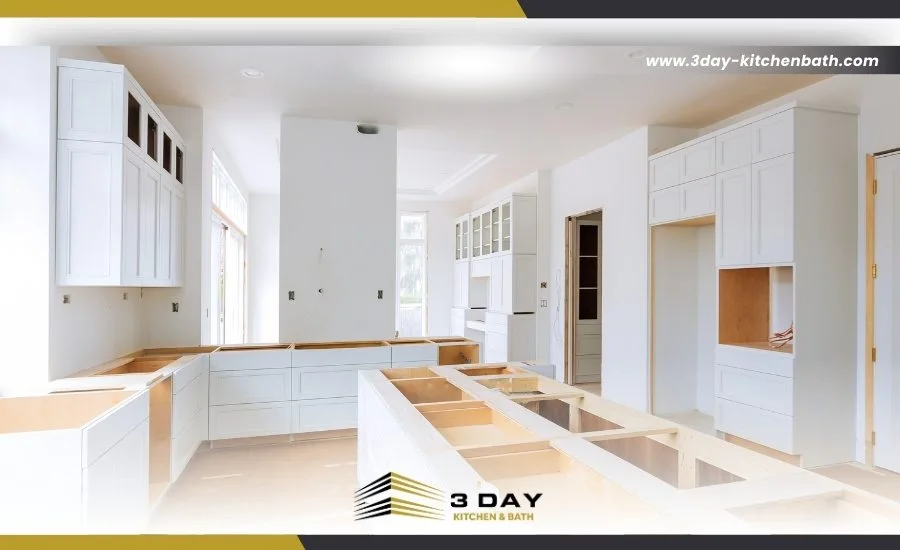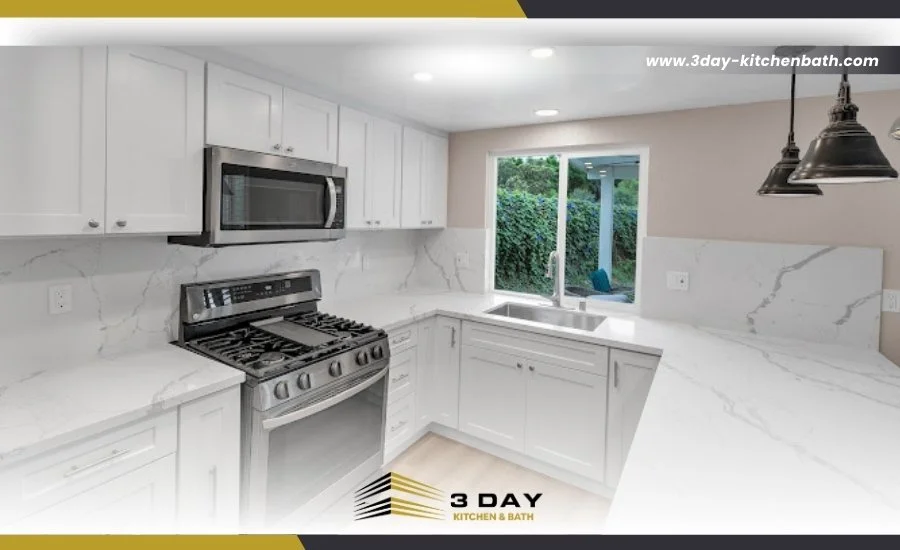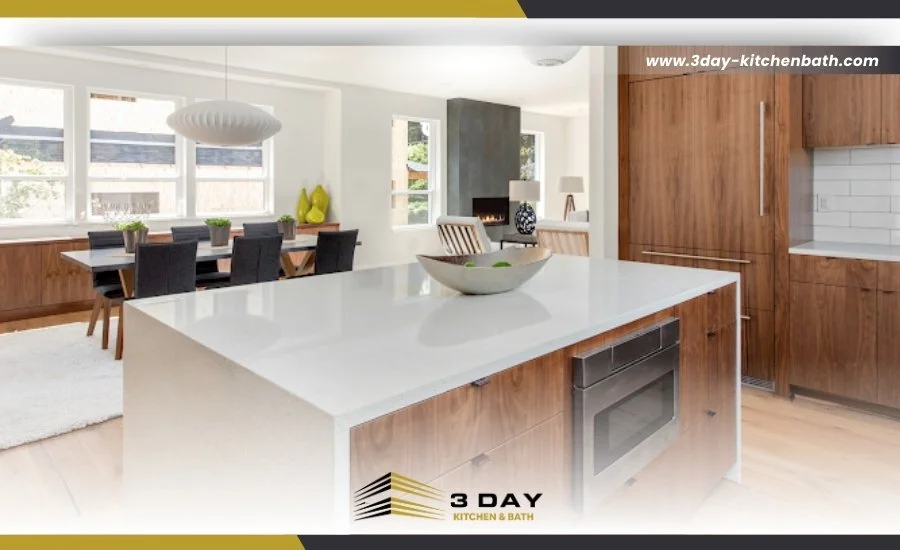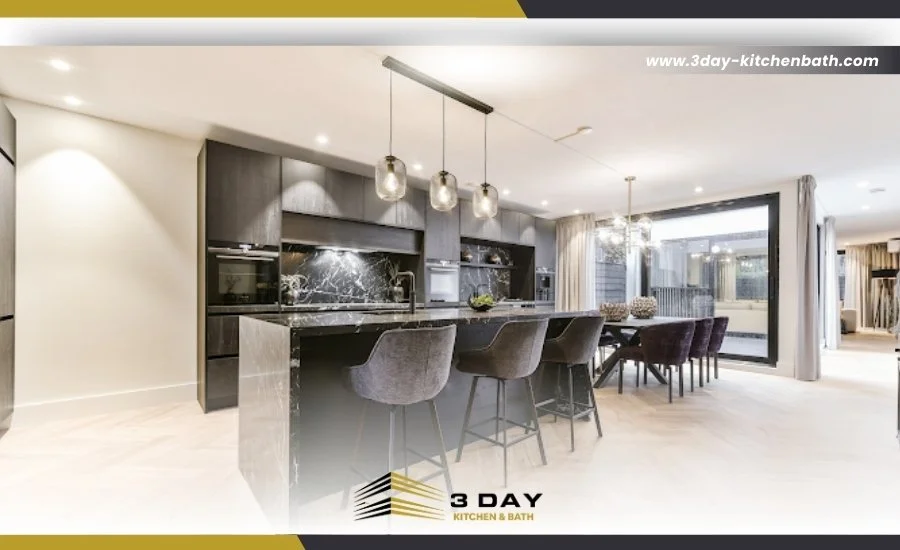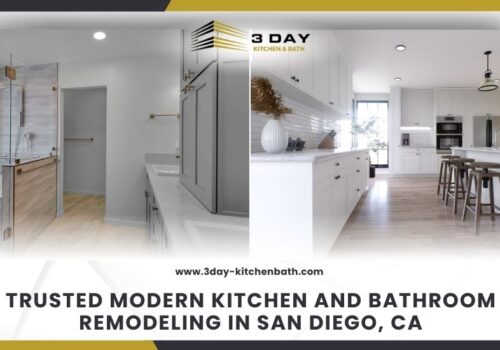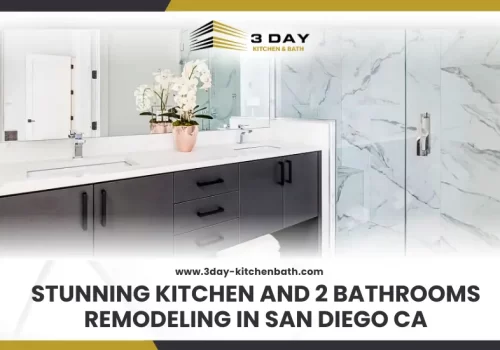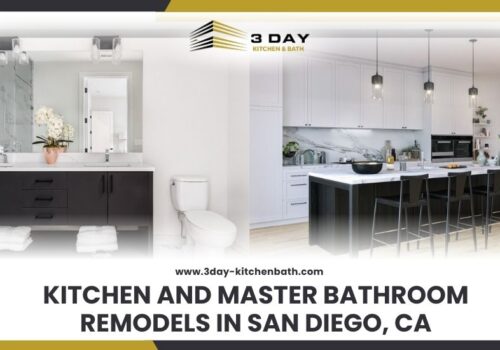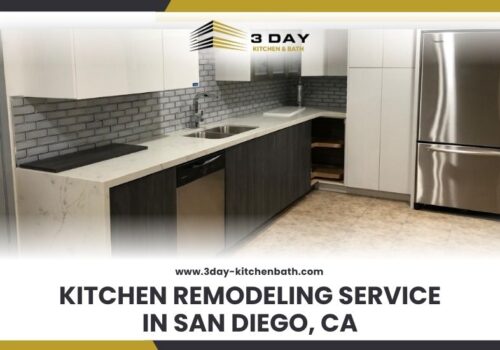- What to Include in Your Kitchen Remodeling Checklist
- Setting Your Remodeling Goals and Priorities
- Budgeting Tips for a Kitchen Remodel
- Essential Steps for a Successful Kitchen Remodel
- Pre-Planning Tasks Before You Start
- Choosing Materials and Appliances
- Avoid Mistakes During Your Kitchen Remodel
- Common Problems and How to Prevent Them
- How to Create a Temporary Kitchen Setup
- Essential Items to Set Aside During the Remodel
- Tips for Managing Meals During Construction
- Final Steps After Completing Your Kitchen Remodel
- Inspecting the Final Work and Ensuring Quality
- Organizing and Decorating Your New Kitchen
- Make the Most of Your Kitchen Remodel
- Frequently Asked Questions
- What permits are needed for a kitchen remodel?
- How do I choose a reliable contractor?
- What are the benefits of energy-efficient appliances?
- Can I reuse existing materials to save money?
- How long does a typical kitchen remodel take?
- Start Your Kitchen Remodel with 3 Day Kitchen & Bath
Planning a kitchen remodel can be daunting, but a detailed kitchen remodeling checklist ensures you stay organized and on track. With this checklist for kitchen remodel, you can prioritize tasks, manage your budget, and avoid common mistakes. Whether you're upgrading appliances, reworking layouts, or refreshing finishes, this guide helps make your remodel smoother and more efficient.
What to Include in Your Kitchen Remodeling Checklist
A well-thought-out kitchen remodeling checklist is your blueprint for success. It outlines the essential steps, helps you prioritize goals, and ensures you address all details of your project. Following this checklist gives you a clear path to your dream kitchen.
Setting Your Remodeling Goals and Priorities
Defining your goals and priorities is the first step to a successful kitchen remodel. Knowing what you want to achieve keeps your project focused and helps avoid unnecessary spending. Use these steps to clarify your goals:
- Identify Pain Points: Write down the things you dislike about your current kitchen, such as lack of storage, poor lighting, or an inefficient layout.
- List Must-Haves: Highlight the features you need in your new kitchen, like energy-efficient appliances, larger counters, or more cabinet space.
- Decide On Aesthetic Preferences: Choose colors, finishes, and design styles that align with your home's overall theme.
- Set A Timeline: Determine your target completion date and account for potential delays, such as material shipping times.
- Balance Functionality And Style: Ensure your kitchen not only looks great but also meets your cooking and storage needs.
By clearly defining your goals, you'll set the foundation for a kitchen remodel that meets your expectations.
Budgeting Tips for a Kitchen Remodel
Creating a realistic budget is essential for managing costs and avoiding financial stress during your remodel. A detailed budget ensures that every dollar is accounted for. Follow these steps to create and maintain a workable budget:
- Assess Your Finances: Decide how much you're willing to spend and set a maximum limit to avoid overspending.
- Break Down Costs: Include major expenses like flooring, cabinets, and appliances, as well as smaller items like cabinet hardware and light fixtures.
- Account For Hidden Costs: Set aside 10–15% of your budget for unexpected expenses, such as plumbing or electrical repairs.
- Research Cost-Effective Options: Consider stock cabinets instead of custom options and explore energy-efficient appliances that may offer rebates.
- Track Expenses: Use apps or spreadsheets to monitor your spending and adjust as needed to stay within budget.
With a clear budget, you can make informed decisions and avoid financial surprises.
Essential Steps for a Successful Kitchen Remodel
Organizing your remodel into clear steps ensures that you stay on schedule and avoid costly mistakes. These essential steps help you approach your kitchen renovation methodically, making it easier to achieve your goals.
Pre-Planning Tasks Before You Start
Preparation is critical for a smooth kitchen remodel. Taking time to assess your needs and set a solid foundation will save you time and money. Follow these steps before starting your remodel:
- Assess Your Current Kitchen: Identify what works and what doesn't. Make a note of issues like insufficient storage, awkward layouts, or outdated designs.
- Measure The Space: Take precise measurements of walls, counters, and appliances to avoid costly errors during installation.
- Define Your Needs: Decide on essential upgrades, such as new cabinets, better lighting, or larger appliances.
- Check Local Regulations: Research permit requirements and ensure your plans comply with local building codes.
- Consult Professionals: Hire reliable contractors or designers for complex tasks like electrical work or structural changes.
Thorough preparation reduces unexpected delays and keeps your project running smoothly.
Choosing Materials and Appliances
Selecting high-quality materials and appliances is a crucial part of your kitchen remodel. Making informed choices ensures durability, functionality, and style. Use these steps to pick the best options:
- Set A Material Budget: Allocate funds for major items like countertops, cabinets, and flooring, ensuring durability within your budget.
- Compare Countertop Options: Choose between granite, quartz, laminate, or other materials based on durability, cost, and maintenance needs.
- Select Durable Cabinets: Look for options that provide ample storage and complement the kitchen's design. Stock cabinets are cost-effective, while custom cabinets offer a tailored fit.
- Choose Energy-Efficient Appliances: Opt for appliances that meet your cooking needs and reduce utility bills. Look for ENERGY STAR ratings for additional savings.
- Verify Dimensions: Measure appliances like ovens and refrigerators to ensure they fit your layout and doorways for hassle-free delivery.
Carefully selecting materials and appliances helps you achieve the perfect balance between style and practicality.
Avoid Mistakes During Your Kitchen Remodel
Even with a solid kitchen remodeling checklist, mistakes can happen. These errors often lead to wasted time, unexpected expenses, or a less-than-ideal outcome. Understanding common problems and how to avoid them keeps your project on track and within budget.
Common Problems and How to Prevent Them
Avoiding typical remodeling pitfalls ensures a smoother renovation process. Follow these tips to address common issues before they escalate:
- Underestimating Costs: Create a detailed budget and include a contingency fund for unexpected expenses, such as structural repairs or material price fluctuations.
- Skipping Permits: Check local regulations and secure the necessary permits before starting. Unpermitted work can lead to fines and legal complications.
- Poor Layout Planning: Ensure the new layout is functional and adheres to the kitchen work triangle principle (sink, stove, and refrigerator in a triangular arrangement).
- Choosing Low-Quality Materials: Invest in durable materials for countertops, cabinets, and flooring to prevent frequent repairs and replacements.
- Hiring Unqualified Contractors: Research contractors thoroughly, read reviews, and check credentials to avoid substandard work or delays.
By anticipating these problems, you'll save time, money, and frustration during your remodel.
How to Create a Temporary Kitchen Setup
Living through a kitchen remodel can disrupt your daily routines, especially when it comes to cooking and dining. Setting up a temporary kitchen keeps your household functional and reduces stress during construction. Follow these tips to prepare an efficient alternative space.
Essential Items to Set Aside During the Remodel
A temporary kitchen requires some essential tools and supplies to make cooking manageable. Set aside these items before construction begins:
- Portable Cooking Appliances: Include a microwave, toaster oven, electric skillet, or portable burner for basic meal preparation.
- Basic Utensils: Keep a few pots, pans, knives, cutting boards, and serving utensils handy.
- Disposable Dishes and Utensils: Use paper plates, cups, and cutlery to minimize dishwashing.
- Storage Solutions: Pack essential pantry items in portable bins or clear containers for easy access.
- Cooler or Mini-Fridge: Store perishable items if your main refrigerator becomes inaccessible during the remodel.
These essentials ensure you can prepare simple meals without hassle while your kitchen is under construction.
Tips for Managing Meals During Construction
Planning meals ahead can save you time and frustration during the remodel. Use these tips to stay organized:
- Prepare Freezer Meals: Cook and freeze meals in advance for quick reheating during the renovation.
- Embrace Simplicity: Stick to one-pot dishes or meals that require minimal preparation and cleanup.
- Rely on Meal Delivery Services: Use local food delivery services or meal kits for convenience during busy construction days.
- Set Up a Dining Area: Create a temporary eating space in another room to maintain a sense of normalcy.
- Stock Non-Perishables: Keep pantry staples like canned goods, pasta, and snacks readily available for quick meals.
These strategies help you manage meals efficiently while minimizing disruptions during your kitchen remodel.
Final Steps After Completing Your Kitchen Remodel
Once your kitchen remodel is complete, it's essential to focus on the final details. Ensuring quality, functionality, and a welcoming aesthetic helps you enjoy your new space to the fullest. Use this section of your kitchen remodeling checklist to wrap up the project effectively.
Inspecting the Final Work and Ensuring Quality
Thoroughly inspecting the finished work helps identify any issues before you start using your new kitchen. Follow these steps to ensure everything meets your expectations:
- Check Contractor Work: Inspect cabinets, countertops, flooring, and appliances for proper installation and finishing. Look for gaps, misalignments, or loose fixtures.
- Test Appliances: Verify that all appliances function correctly, including the refrigerator, oven, dishwasher, and any additional installations.
- Inspect Plumbing and Electrical Work: Turn on faucets to check water pressure and look for leaks. Test outlets, light switches, and built-in lighting fixtures for proper operation.
- Review Design Elements: Ensure the materials, finishes, and colors match the agreed-upon plan and your expectations.
- Create a Punch List: If you find issues, document them and share the list with your contractor for prompt resolution.
A thorough inspection guarantees your new kitchen is both functional and visually appealing, leaving no detail overlooked.
Organizing and Decorating Your New Kitchen
Organizing and decorating your remodeled kitchen helps create a space that is not only beautiful but also highly functional. Use these steps to settle into your new space:
- Plan Storage Strategically: Assign cabinets, drawers, and shelves based on how frequently you use items. Place everyday tools within easy reach and store less-used items higher up.
- Add Organizational Accessories: Use drawer dividers, shelf risers, and pull-out baskets to maximize storage and keep everything neat.
- Decorate Thoughtfully: Incorporate decorative touches like potted plants, framed artwork, or stylish dishware to add personality without cluttering the space.
- Set Up Functional Zones: Organize your kitchen into zones for cooking, food prep, and storage to streamline daily tasks.
- Celebrate the Transformation: Host a small gathering or prepare a special meal to enjoy and show off your new kitchen.
Organizing and decorating your kitchen transforms it into a space that's as practical as it is inviting.
Make the Most of Your Kitchen Remodel
A successful kitchen remodel requires careful planning, organization, and execution. Using a detailed kitchen remodeling checklist helps you prioritize tasks, avoid mistakes, and stay on budget. By focusing on materials, layout, and functionality, you can create a kitchen that fits your lifestyle and design preferences.
3 Day Kitchen & Bath ensures San Diego homeowners experience hassle-free remodels with expert guidance at every step. Whether you're modernizing your space or improving its functionality, our team provides solutions tailored to your needs. Trust us to bring your kitchen vision to life.
Frequently Asked Questions
What permits are needed for a kitchen remodel?
Permits depend on the scope of your remodel. Structural changes, electrical work, plumbing updates, or adding gas lines usually require permits. Check local regulations in San Diego, CA, to understand requirements. Working with professionals like 3 Day Kitchen & Bath ensures all necessary permits are obtained.
How do I choose a reliable contractor?
Look for contractors with experience, positive reviews, and valid licenses. Ask for references and review past projects. In San Diego, 3 Day Kitchen & Bath is a trusted name known for high-quality work and exceptional service.
What are the benefits of energy-efficient appliances?
Energy-efficient appliances reduce utility bills and are better for the environment. Features like ENERGY STAR ratings ensure optimal performance with minimal energy use. They also come with potential rebates, making them a smart long-term investment.
Can I reuse existing materials to save money?
Yes, reusing cabinets, countertops, or appliances in good condition can cut costs. Repurposing or refinishing items can give them a fresh look while staying within budget. Consult your contractor for advice on what can be salvaged.
How long does a typical kitchen remodel take?
The timeline varies depending on the size and complexity of the project. On average, a kitchen remodel takes 4 to 8 weeks, including planning and construction. 3 Day Kitchen & Bath specializes in streamlined remodels, completing projects efficiently in San Diego.
Start Your Kitchen Remodel with 3 Day Kitchen & Bath
Ready to transform your kitchen? Trust 3 Day Kitchen & Bath in San Diego, CA, for expert design and efficient remodeling services. Call us today at (619) 558-6950 to schedule your consultation and begin your project.


